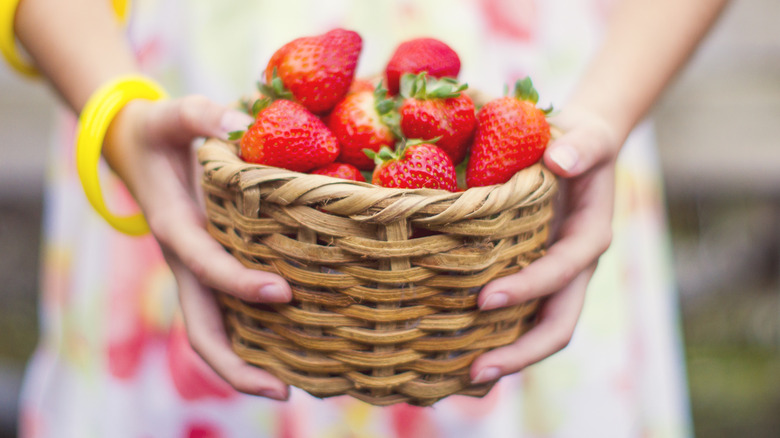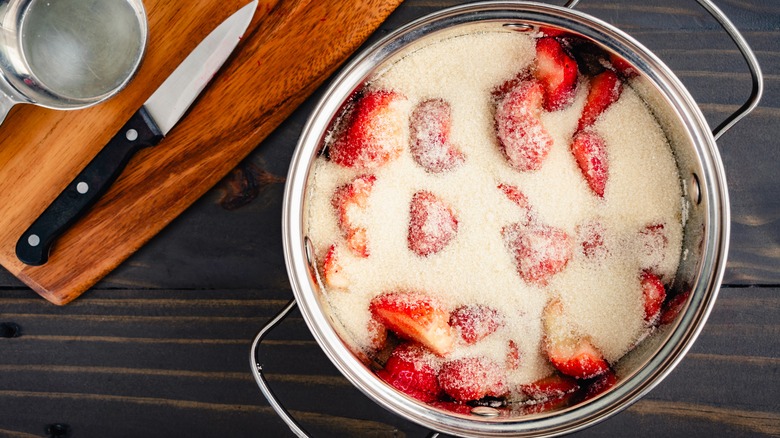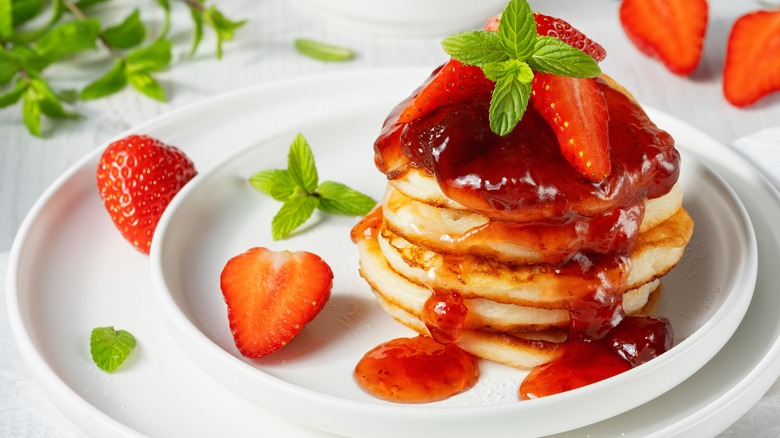Stop Cooking Strawberries And Do This To Preserve Their Sweet Essence
Strawberries are one the most saccharine, sugary-sweet fruits of them all, right? The reason for that is more complicated than you might think. Although we perceive them as sweet, strawberries contain significantly less sugar than other fruits like blueberries and apples and it's actually their aroma that's responsible for their dulcet nature. This tasty fragrance is brought to you by a series of volatile compounds — tiny molecules that evaporate easily into the air, carrying the delicious scent of ripe strawberries, particualarly when it's warm. However, volatile compounds are sensitive to extreme heat. When strawberries are cooked, these compounds evaporate, and the fruit loses its vibrant flavor and smell. You might find yourself cooking strawberries for jams, sauces, and compotes, but you're better off macerating them to preserve their sweet flavor and aroma.
Macerating strawberries is a simple technique similar to marinating meat, where the fruit is submerged in a substance to draw out moisture and soften its texture. Typically, strawberries, and any other fruit for that matter, are dusted with sugar to extract their natural juices. Over time, macerated strawberries develop a soft, jammy texture that, unlike cooking, maintains their bold flavor and fragrance. But just how long should you macerate fruit? The longer they sit, the softer they'll become, but a good rule of thumb is at least 30 minutes. However, you can leave them overnight to maximize juiciness.
Non-traditional strawberry maceration methods
Macerating strawberries with sugar is a tried-and-true method. However, it's not the only sweetener you can use to achieve a soft, squishy, and juicy texture. If you're someone who limits their added sugar intake, consider macerating strawberries with honey instead. Not only will this achieve the same effect as macerating with sugar, but it will also imbue them with a bright, floral flavor. If honey isn't your thing, consider using maple syrup to thread them with warm, caramelized notes. Another option is agave nectar, which will develop a botanical flavor. For something on the savory side, macerate strawberries in balsamic vinegar to give them a tangy, fig-forward flavor that rivals the dessert-inspired spirit of classic sweeteners.
Beyond syrups and sugars, strawberries can also be macerated in liquor to fashion a homemade liqueur studded with boozy berries. The final product is a spirit that's sweet, tangy, and juicy — perfect for making summertime cocktails and just one of many liqueurs you should keep behind your home bar. You can also macerate them in fruit juice for a non-alcoholic option. Don't hesitate to introduce added ingredients such as cinnamon, nutmeg, or vanilla extract for added depth of flavor. The world is at your fingertips with maceration, so don't be afraid to get creative by infusing them with other sweet and savory flavors.
Uses for macerated strawberries
Macerating strawberries is an easy process that foodies new to the kitchen can hack just as easily as kitchen experts. But macerating them is only half the battle. Next, you'll need to find some ways to put these jammy berries to good use. You can use macerated strawberries as a topping for desserts, like cakes, pies, cheesecakes, and pavlovas, to give them a tart, refreshing twist that makes every forkful more refreshing. Not into cakes and pies? Spoon a dollop of macerated strawberries over a cup of ice cream to cut through the richness with a fruity, zippy flavor profile. Breakfast, anyone? Macerated strawberries, particularly those made with honey, are nutrient-dense breakfast toppers well-suited for jazzing up parfaits, waffles, and pancakes.
Throw your macerated berries into a cocktail to give them a fruity, juicy edge that curbs the bite of the booze. Plus, they'll add a garden-fresh visual appeal to your favorite libations — double win! Surprisingly, macerated berries are great in savory dishes as well. Toss them into spring salad with arugula, goat cheese, and walnuts for an uplifting and nutrient-dense lunch. They also work great on hearty sandwiches and alongside charcuterie provisions. Raw or macerated, however you take your strawberries is entirely up to you. But next time you stumble upon a recipe that calls for cooked strawberries, consider macerating them instead to preserve their sweet flavor.


